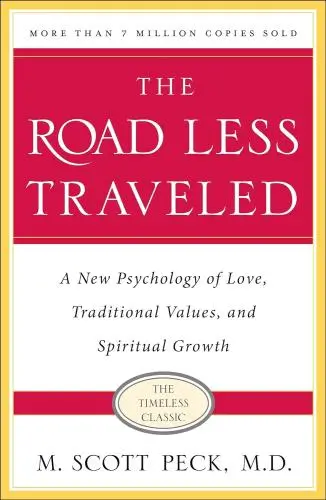
The Road Less Traveled
A New Psychology of Love, Traditional Values and Spiritual Growth
What's it about?
The Road Less Traveled by is a groundbreaking self-help book that explores the importance of discipline, love, and growth in leading a fulfilling life. Through a blend of psychology, spirituality, and practical advice, Peck challenges readers to confront their fears, take responsibility for their choices, and embrace the journey of personal transformation. This insightful guide offers valuable insights on building healthy relationships, overcoming obstacles, and finding true meaning and purpose.
About the Author
M. Scott Peck was a psychiatrist and author known for his best-selling book "The Road Less Traveled." He explored topics such as personal growth, spirituality, and psychology in a straightforward and compelling style. Peck's work often challenged conventional thinking and encouraged readers to embrace introspection and self-improvement. His unique perspective on human behavior and relationships continues to inspire readers seeking personal transformation and a deeper understanding of themselves.
10 Key Ideas of The Road Less Traveled
Embrace Responsibility for Your Life
Taking responsibility for your own actions, decisions, and well-being is crucial.
It means acknowledging that you are in control of your life's direction.
This approach fosters a sense of empowerment and discourages blaming others or external circumstances for personal challenges.
By accepting responsibility, you cultivate resilience and a proactive attitude towards solving problems.
Learn DeeperReflect Daily: Spend a few minutes each day reflecting on your decisions and actions. Ask yourself what went well, what didn’t, and how you can improve tomorrow. This habit fosters self-awareness and personal growth.
Set Personal Goals: Clearly define short-term and long-term goals for different aspects of your life (career, personal development, relationships). This helps you take control and steer your life in the direction you want it to go.
Practice Accountability: When things don’t go as planned, resist the urge to blame others or external circumstances. Instead, ask yourself what role you played in the outcome and what you can do differently next time.
Seek Feedback: Regularly ask for feedback from friends, family, or colleagues. This can provide insights into areas of your life you may need to take more responsibility for and can guide your personal development efforts.
Embrace Challenges: View challenges as opportunities to learn and grow rather than obstacles. Taking responsibility means tackling these head-on, learning from failures, and celebrating successes.
- Example
If you’re struggling at work, instead of blaming your team or the workload, take a step back and assess your own performance. Could you improve your time management or communication skills? Setting personal goals to develop these areas shows you’re taking responsibility for your career progression.
- Example
When a personal relationship encounters difficulties, look at your own actions and communication patterns. Have an open conversation where you take responsibility for your part in the conflict and discuss ways to improve the relationship together. This approach fosters understanding and healing.
Value the Importance of Discipline
Discipline is fundamental for growth and self-improvement.
It involves choosing long-term benefits over short-term gratifications, which is essential for achieving meaningful goals.
Discipline enables you to practice self-control, focus on your objectives, and persist through difficulties.
It's about making consistent efforts, even when it's challenging, to bring about positive changes in your life.
Learn DeeperSet Clear, Achievable Goals: Start by defining what you want to achieve in both the short and long term. Make sure these goals are specific, measurable, achievable, relevant, and time-bound (SMART).
Create a Daily Routine: Incorporate discipline into your daily life by establishing a routine. Dedicate specific times for work, exercise, learning, and relaxation. Stick to this schedule as closely as possible.
Practice Delayed Gratification: Whenever you're faced with a choice between an immediate pleasure and a more rewarding long-term goal, choose the latter. Remind yourself of the bigger picture and the rewards that come with patience.
Monitor Your Progress: Keep a journal or use an app to track your progress towards your goals. Celebrate small victories to stay motivated, but also be honest about setbacks and learn from them.
Seek Accountability: Share your goals with a friend, family member, or mentor who can hold you accountable. Regular check-ins with this person can help keep you on track.
- Example
If your goal is to get in shape, discipline might involve waking up an hour earlier each morning to exercise before work, even when you'd rather sleep in. It means consistently choosing workouts over watching TV or scrolling through social media.
- Example
For someone aiming to save money for a down payment on a house, discipline could mean setting aside a certain percentage of each paycheck into a savings account, foregoing immediate pleasures like dining out or impulsive online shopping in favor of reaching their financial goal.
Cultivate Love Through Action
Love is not merely a feeling but an action that requires effort and discipline.
It involves extending oneself for the growth and well-being of another.
This concept emphasizes that love is a choice and an act of will.
By actively loving others, you contribute to their happiness and development, which, in turn, enriches your own life and relationships.
Learn DeeperPractice Active Listening: When engaging with others, give them your full attention. Listen without planning your response. This shows that you value their thoughts and feelings, fostering a deeper connection.
Perform Small Acts of Kindness Regularly: Whether it's helping a colleague with a task, cooking a meal for a loved one, or simply offering a genuine compliment, these actions contribute to the well-being of others and strengthen your relationships.
Express Gratitude: Make it a habit to thank people for what they do, no matter how small. Acknowledging others' efforts and kindness is a powerful way to show love and appreciation.
Set Aside Quality Time: Dedicate uninterrupted time to spend with those important to you. Whether it's a weekly dinner date or a monthly outing, quality time is crucial for relationship growth.
Be Patient and Offer Support: Understand that everyone has their struggles. Offering your patience and support during tough times is a significant expression of love.
- Example
If your friend is going through a difficult period, instead of just offering sympathy, you could actively listen to their concerns, help them with daily tasks, or even just spend time with them to show your support.
- Example
In a romantic relationship, instead of just saying 'I love you,' show your partner love by doing things that make their life easier or happier, like preparing their favorite meal after a long day, or taking over chores when they're overwhelmed.
Embrace Growth and Change
Personal growth often requires facing uncomfortable changes and challenges.
Embracing growth means being open to new experiences, learning from failures, and adapting to change.
This mindset encourages continuous self-improvement and helps overcome fear of the unknown.
By accepting that change is a natural part of life, you can navigate life's transitions more smoothly and with greater resilience.
Learn DeeperReflect Daily: Spend a few minutes each day reflecting on what you learned, how you adapted to new situations, and what challenges you faced. This can help you become more aware of your growth and areas for improvement.
Set Small, Achievable Goals: Break down your larger goals into smaller, manageable tasks. This makes the process of change less daunting and allows you to celebrate small victories along the way, which can motivate further growth.
Seek New Experiences: Actively look for opportunities to step out of your comfort zone. This could be as simple as trying a new hobby, traveling to a new place, or even changing your routine. New experiences are catalysts for growth.
Embrace Failure as a Learning Opportunity: Instead of fearing failure, view it as a chance to learn and improve. Reflect on what went wrong, what you could do differently next time, and how you can use this experience to grow.
Practice Mindfulness: Engage in mindfulness practices such as meditation or journaling. These can help you become more attuned to your thoughts and feelings about change, making it easier to navigate through them.
- Example
Imagine you've always wanted to learn a new language but have been putting it off due to fear of failure. You decide to embrace growth by signing up for a beginner's class, setting a goal to practice for 15 minutes each day. Each mistake in practice becomes a learning point rather than a setback.
- Example
You're offered a new job that requires relocating to a different city. Instead of immediately dismissing the opportunity due to the fear of change, you consider the potential for personal and professional growth. You make a list of pros and cons, talk to friends or mentors for advice, and decide to accept the offer, viewing it as a step forward in your career and personal development journey.
Practice Open and Honest Communication
Effective communication is key to building strong, healthy relationships.
It involves expressing your thoughts and feelings openly and listening attentively to others.
Honesty fosters trust and understanding, while active listening shows respect and empathy.
By prioritizing clear and compassionate communication, you can resolve conflicts constructively and deepen your connections with others.
Learn DeeperStart with 'I' Statements: When expressing your feelings or thoughts, begin sentences with 'I' feel or 'I' think. This approach takes ownership of your emotions and reduces the likelihood of the other person feeling attacked or defensive.
Practice Active Listening: Show that you are engaged in the conversation by nodding, maintaining eye contact, and repeating back what you've heard to confirm understanding. Avoid interrupting or formulating your response while the other person is still speaking.
Schedule Regular Check-ins: Set aside dedicated time to discuss your relationship, any concerns, or simply how you're feeling. This can be weekly or monthly, but it should be a time when both parties are relaxed and not rushed.
Embrace Vulnerability: Share your fears, hopes, and dreams. Being vulnerable can strengthen bonds and foster a deeper level of intimacy and trust.
Seek to Understand Before Being Understood: When a disagreement arises, make an effort to understand the other person's perspective fully before trying to get your point across. This can lead to more empathetic and productive discussions.
- Example
During a disagreement about household chores, instead of saying, 'You never do any cleaning around here,' you could say, 'I feel overwhelmed with the amount of cleaning and would appreciate some help. Can we discuss a way to divide the chores fairly?'
- Example
When your partner shares something important with you, instead of immediately offering advice or sharing a similar experience, you could say, 'It sounds like you had a really tough day. Do you want to talk more about it, or would you like some advice on how to handle it?'
Deeper knowledge. Personal growth. Unlocked.
Unlock this book's key ideas and 15M+ more. Learn with quick, impactful summaries.
Read Full SummarySign up and read for free!
The Road Less Traveled Summary: Common Questions
Experience Personalized Book Summaries, Today!
Discover a new way to gain knowledge, and save time.
Sign up for our 7-day trial now.
No Credit Card Needed

Similar Books

The Hobbit
J.R.R. Tolkien
Fichte
Johann Gottlieb Fichte
English Spirituality
Gordon Mursell
Serpent Rising: The Kundalini Compendium
Neven Paar
Feeling Is the Secret
Neville Goddard
How to Read the Akashic Records
Linda Howe
I Who Have Never Known Men
Jacqueline Harpman
Key Approaches to Biblical Ethics
Rabens, Volker
Macbeth
William Shakespeare
Hamlet
ShakespeareTrending Summaries

Peak
Anders Ericsson
Never Split the Difference
Chris Voss
Smart Brevity
Jim VandeHei
The Psychology of Money
Morgan Housel
The First 90 Days
Michael D. Watkins
Atomic Habits
James Clear
Thinking, Fast and Slow
Daniel Kahneman
The Body Keeps the Score
Bessel van der Kolk M.D.
The Power of Regret
Daniel H. Pink
The Compound Effect
Darren HardyNew Books

Forex Trading QuickStart Guide
Troy Noonan
Comprehensive Casebook of Cognitive Therapy
Frank M. Dattilio
The White Night of St. Petersburg
Michel (Prince of Greece)
Demystifying Climate Models
Andrew Gettelman
The Hobbit
J.R.R. Tolkien
The Decision Book
Mikael Krogerus
The Decision Book: 50 Models for Strategic Thinking
Mikael Krogerus
Fichte
Johann Gottlieb Fichte
Do No Harm
Henry Marsh
